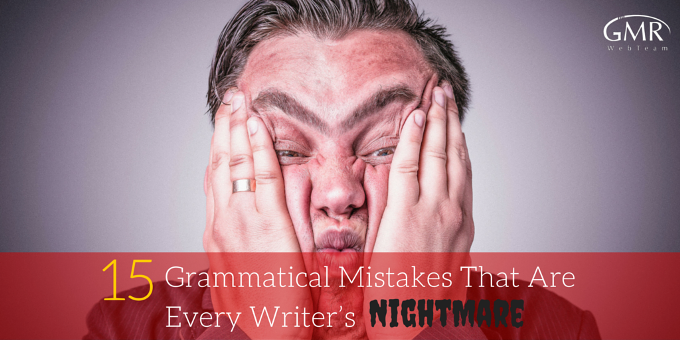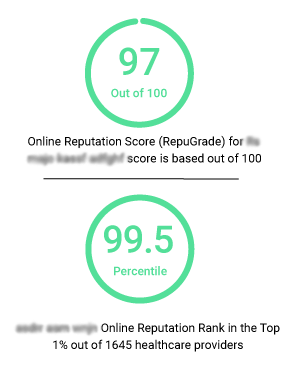15 Grammatical Mistakes That Are Every Writer's Nightmare
 Writing is a powerful form of communication, but its credibility can be diminished in several ways. Grammatical errors (we’re absolutely certain about this) is one of those. No matter how deep your understanding is about a certain topic or how well you write, a simple, common word conflict or spelling mistake can easily take all that away. This applies to every blogger, copywriter and marketer out there.
Writing is a powerful form of communication, but its credibility can be diminished in several ways. Grammatical errors (we’re absolutely certain about this) is one of those. No matter how deep your understanding is about a certain topic or how well you write, a simple, common word conflict or spelling mistake can easily take all that away. This applies to every blogger, copywriter and marketer out there.
Here are 15 common grammar mistakes that possibly are every writer's’ biggest nightmare.
Personal Style
Bloggers must stand out beyond gaining reputation as providers of accurate facts. The writing needs to be presented in a personal way, mixing personality with knowledge. That's why sometimes it's acceptable to move away from the Strunk and White playbook of strict rules for using the English language. Learning the rules then breaking them gives you a broad perspective on writing style. Occasionally you can get away with misspelling words for the sake of humor and style. You may still face criticism, however, from purists who do not accept trends or individual expression as legitimate deviations from established spellings.
Long Words
If you use uncommon scientific words or industry jargon that you do not write regularly, it's best to double-check the spelling. Misspelling an important industry word can damage your credibility quickly among professionals. Sometimes writers throw in hyphens that don't belong into long words, and sometimes they leave out hyphens where they do belong.
Double Letters
A common spelling error is getting "loose" mixed up with "lose." During the typing of a rough draft sometimes a finger hits a key a second time by accident. Another example is how "choose" can get mixed up with "chose."
Me vs. I
Many times writing in first person can present misuse of the words "me," "myself" and "I." The main reason "I" is used when the proper form is "me" is that "I" sounds more proper. "The only employee who got a raise was me" is proper, whereas some people may improperly end the sentence with "I." The word "myself" is best used after "I" or in a context such as "I had to ask myself."
Who and Whom
It's fairly common for writers to get "who" and "whom" mixed up. "Who" is a subjective pronoun similar to "he" or "she," while "whom" is an objective pronoun similar to "him" and "her."
Affect and Effect
The confusion between "affect" and "effect" is more of a clumsy mistake rather than lack of understanding of the definitions. "Affect" is a verb while "effect" is a noun that reflects a result. "My vote affects local government, leading to various effects on the community" is a sentence that presents the differences in meaning.
Lay vs. Lie
One of the most common spelling mistakes among even seasoned writers, "lay" is often confused with "lie" due to a misunderstanding of tenses. "Lay" can be used as a verb if it involves a corresponding object, such as "I lay the pillow down." The past tense "laid" can also be used as a verb. "I laid on the bed" is considered improper, while "I lie on the bed" is considered proper.
Then vs. Than
The improper use of "then" and "than" is usually a result of laziness. Most people know that "then" is used to express a time period while "than" is used for comparisons.
Improper Apostrophes
An apostrophe is used for contractions (don't) and to show possession (Jennifer's blog). One of the most common misuses of the apostrophe is the confusion between "it's" and "its." While it's is a contraction for "it is," its is used to show possession and does not need an apostrophe. Certain style books do not require an apostrophe before the "s" for the name of decades such as the "2010s." When in doubt, it's best to leave the apostrophe out.
Too Many Commas
The purpose of commas is to break up thoughts where pauses are naturally inserted. A sentence with multiple commas could be classified as a run-on sentence, especially if there is no verb. When a sentence begins to look like a paragraph, it's advantageous to break it into smaller sentences, making it easier to read.
Parallelism in Bullet Points
Bullet points need to have a consistent flow, beginning with the same part of speech. Each bullet point, for example, should be expressed consistently with a word or phrase such as "a benefit is." Sometimes writers will stray away from verbs that would give the bullet points more impact.
Abbreviations
There are plenty of abbreviations in the English language that are misused or have become outdated. The abbreviation "i.e." for "in order words" was much more common last century, as was "e.g." as an abbreviation of "for example." Often "i.e." provides clearer information while "e.g." is used for specific examples that back up assertions.
"Of" In Place of an Apostrophe
The most obvious way to misuse an apostrophe is to replace it with the word "of." Contractions such as "should've" and "could've" are sometimes mistakenly transformed into "should of" and "could of."
Awkward Sentence Structure
If you're not careful where you place descriptive phrases, it can paint an unclear picture. A sentence such as "buried underneath a pile of papers, my boss found the report he had been looking for all year," does not clarify if the boss or the report were buried in papers. A clearer statement would be "my boss found the report he had been looking for all year, buried underneath a pile of papers."
Sentences Ending in Prepositions
Sometimes we forget what we learned in grade school – that sentences are not supposed to end in prepositions. The word "at" is a preposition meant for phrases such as "at the store," not "where are you at?"
Comments are closed


